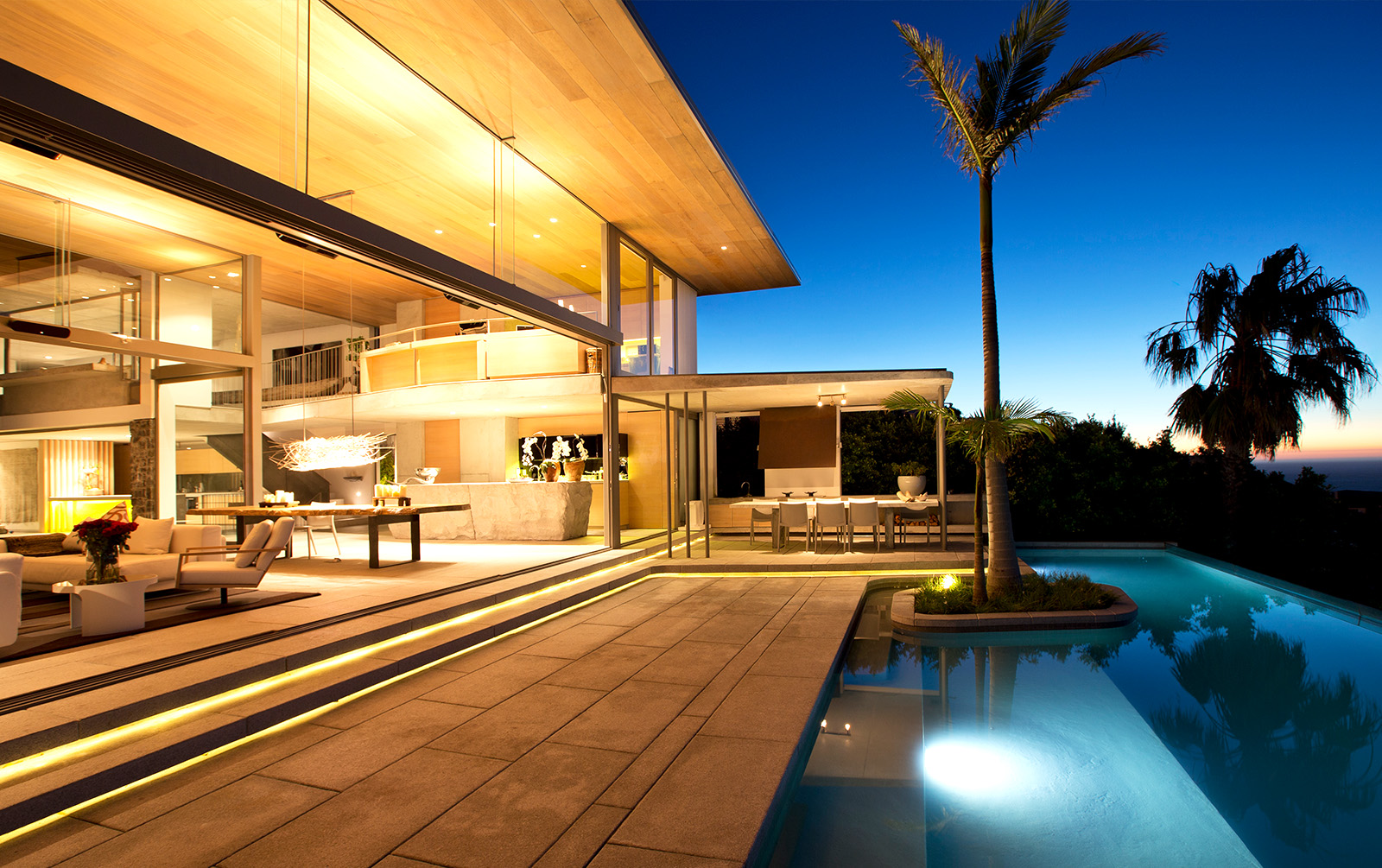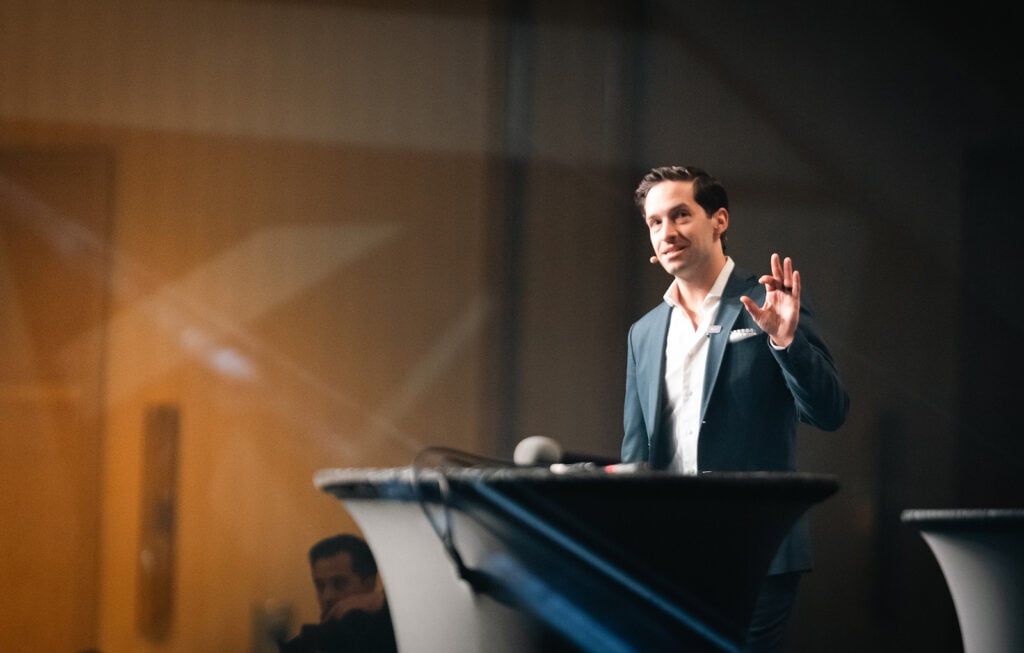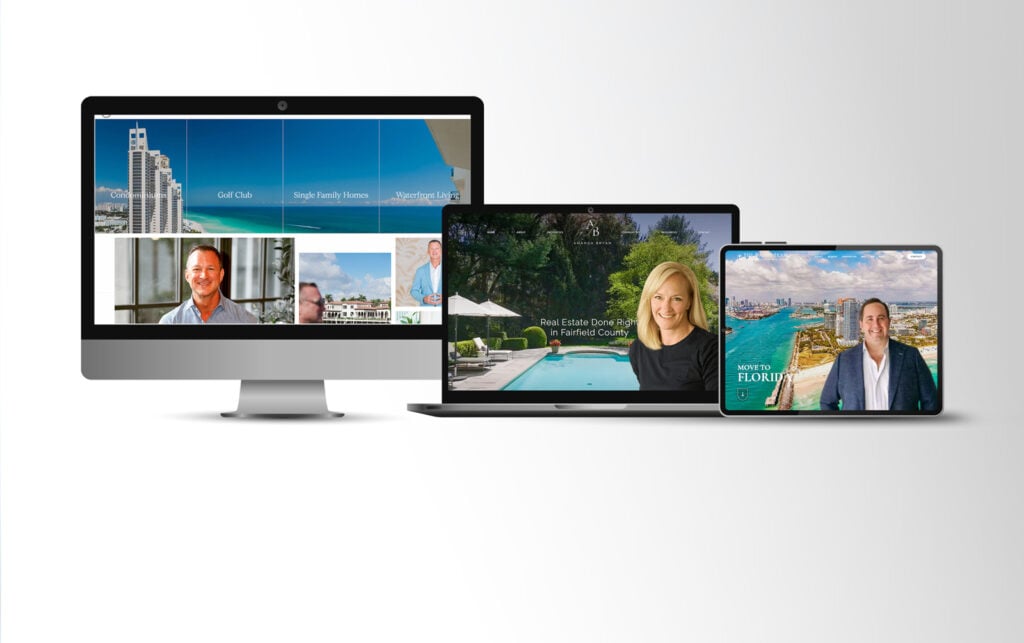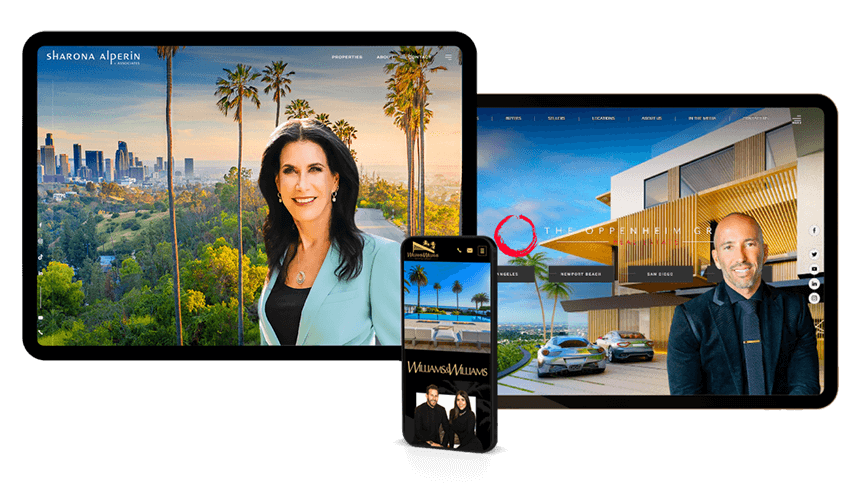Building a Smarter Luxury Real Estate Marketing Strategy
Marketing starts with one core truth: to sell anything, you have to understand your buyer. As Peter Drucker put it, “The aim of marketing is to know and understand the customer so well the product or service fits him and sells itself.” So, the more you know your target market, the easier it is to sell.
Translated to the language of luxury real estate, that means tuning in to what high-net-worth buyers truly desire—privacy, status, lifestyle—instead of just presenting square footage and specs and calling it a day.
This guide will walk you through how to market your luxury listing with that level of clarity. From identifying your ideal buyer to crafting a compelling story and choosing the right platforms, you’ll learn how to position a property so it actually reaches the people who need to hear it. Let’s dive in.
Table of Contents
Tips for Marketing Your Luxury Listing Effectively
-
Create a customer profile
Understanding your customer starts with understanding what they expect. Although you’re selling to the luxury market, younger buyers have different wants and needs than older buyers. A retired couple from New York may approach a Beverly Hills estate differently than a tech entrepreneur eyeing a Miami high-rise.
Consider the property's location, lifestyle appeal, and value proposition. Is this a primary residence or a second home? Will the buyer likely be local, relocating, or international? Try to picture not just who they are, but how they live.
You might start by answering a few key questions:
-
What stage of life is this buyer in?
-
What kind of experience does the home offer?
-
What problem does it solve or desire does it fulfill?
-
-
Price your property correctly
Marketing can attract attention. But if the price is misaligned, that attention rarely turns into action.
Review comparable properties, study local trends, and think carefully about how your price positions the listing. In some cases, a well-calibrated number can create early momentum and send the right signal to buyers and their agents.
-
Know your market
Buyers respond to clarity. They want to work with someone who can explain where a property sits in the current landscape, what it’s worth, and who’s likely to want it.
Anne Hogan Perry, a luxury expert in Hawaii, puts it well: “You need to know your market inside and out—backward, forwards, and upside down. There’s simply no substitute for deep market knowledge. Without it, you won’t be able to stand out from the crowd.”
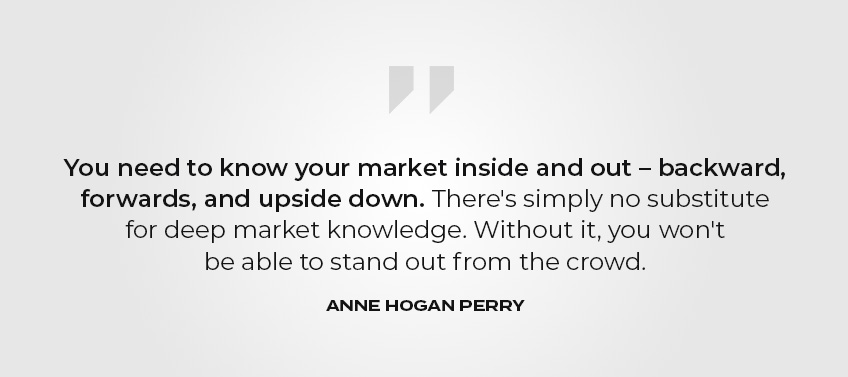
That kind of fluency is built by following the data closely, noting shifts in buyer behavior, and understanding how pricing, pace, and product interact across different segments. The sharper your awareness, the more confidently you can advise—and the more trust you’ll earn in return.
-
Market the lifestyle, not the layout
It can help to think beyond square footage and features. What you’re really offering is a way of life—something a buyer can picture themselves stepping into.
Instead of listing amenities, try telling a story. A wine room, for instance, becomes much more engaging when it’s framed as the backdrop for candlelit tastings with close friends. The more vividly you can illustrate the experience of living in the home, the more emotionally resonant the listing becomes.
Also, highlight the neighborhood. Is it known for walkable streets, tucked-away cafés, or a private beach path? These lifestyle cues often hold more appeal than specs alone.
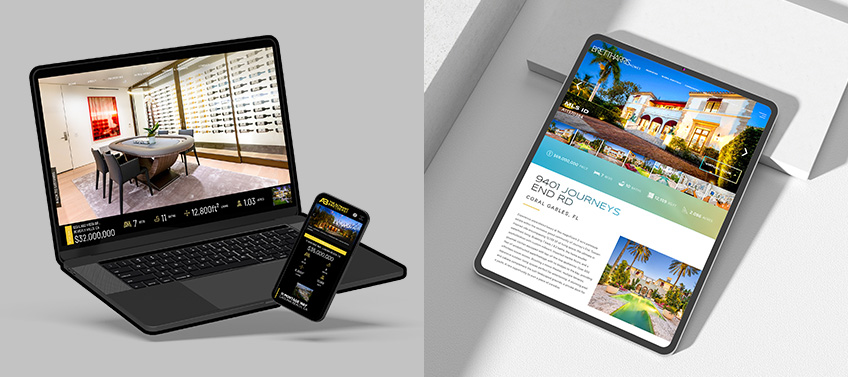
As agents, your online presence and branding plays a crucial role in effective luxury real estate marketing.
-
Highlight experiences over features
Many affluent buyers care as much about the lifestyle a home offers as they do about its features. That shift opens the door to creative framing.
If there’s a distinctive element in the home (say, a landscaped backyard), it might resonate more when described as a private meditation garden. A guest room could be reimagined as a wellness space or an art studio. These aren’t exaggerations, just reframing opportunities that help buyers see what’s possible.
In visual marketing, it may be worth including scenes that reflect this lifestyle. Yoga on the terrace, a quiet coffee moment at sunrise, a glass of wine by the pool at dusk— small touches that can create a lasting impression.
-
Lean on a skilled creative team
While high-quality tools are widely accessible, outcomes still depend on experience and expertise. In the luxury space, buyers expect visual materials that feel deliberate and elevated. Anything less can undermine the perception of value.
A professional photographer or videographer who understands light, scale, and composition can capture the property in a way that aligns with how the home lives. Staging should also be approached with the same level of care. Rather than filling space, the goal is to create flow and atmosphere.
-
Refine your online presence
Buyers often look you up before they contact you. Your website, social profiles, and digital marketing materials all contribute to how you’re perceived. It helps to keep your site up to date, with clear branding and recent listings. On social media, consider sharing listing content alongside market insights or behind-the-scenes details from your work.
Take charge of your online presence.
Your clients expect professionalism at every touchpoint. We’ll help you deliver it—on your website, your marketing, and everywhere they’re looking.
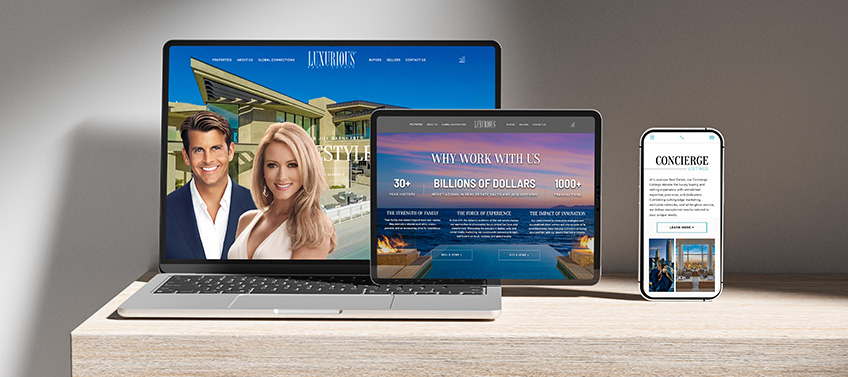
Your digital presence is often your customer’s first impression of you, and in luxury real estate, first impressions count.
Top Luxury Marketing Trends and Strategies for 2025
Luxury real estate marketing in 2025 leans more toward refinement than reinvention. The core tools remain familiar, but how you use them continues to evolve. Quality presentation and clear audience targeting carry more influence than volume or novelty.
-
Luxury listing presentations
A well-prepared listing package offers clarity and tone before a word is spoken. Buyers will feel the difference in a clean, spacious layout, a confident property narrative, and imagery that feels considered rather than decorative. It helps to approach each listing book or PDF as a quiet extension of the home itself.
-
Drone photography and videography
Aerial visuals remain one of the most effective ways to showcase estates with land, ocean views, or architectural drama. For homes with impressive approach drives, water features, or dramatic elevation, a bird’s-eye perspective can add emotional scale. It may also help to pair drone footage with ground-level video to provide a fuller sense of movement through the space.
-
3D virtual tours
Virtual walkthroughs are now an expected part of the package, particularly for out-of-town buyers. These tools offer quiet flexibility; viewers can explore at their own pace, return to rooms they like, and form an early sense of layout. It helps to keep the interface clean and the path easy to follow, so the experience feels smooth rather than technical.
-
Social media
On platforms like Instagram and Facebook, a curated, well-paced rollout can create momentum. Behind-the-scenes stories and polished lifestyle clips often do more than a static carousel.
If the budget allows, targeted paid campaigns using demographic and location filters can help surface the listing to qualified eyes.
-
Email marketing
Email continues to perform well when the content is focused and well-designed. Consider segmenting your list by buyer type or location, then tailoring the message to each group. A clean layout with one strong image and a direct link often works best.
You might also use follow-up emails for agents, advisors, or past clients who tend to respond to more personal outreach.
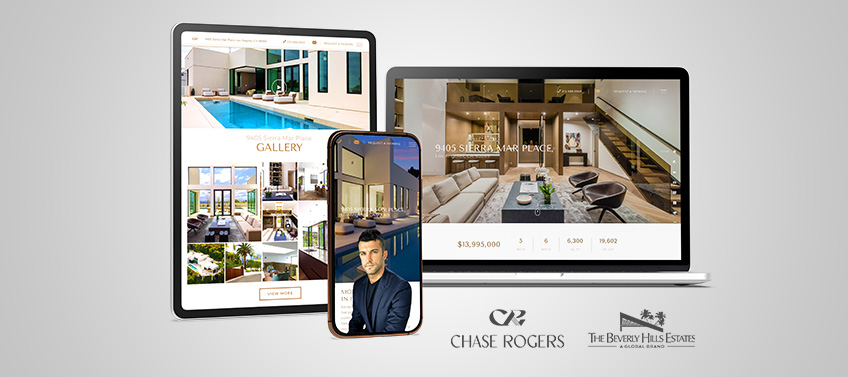
Top agents trust Agent Image to create stunning, high-powered luxury real estate websites that attract valuable leads and potential buyers.
-
Dedicated property website or page
Some homes benefit from having their own digital presence. A simple microsite or single-page layout gives you space to include full-screen visuals and lifestyle-focused copy. The link also offers a straightforward way to distribute the listing across social ads or digital campaigns.
If you don’t already have a go-to team for design or hosting, working with professionals who specialize in real estate branding can help the site look and feel tailored from the start.
Elevate your listings with a custom-designed site.
Our team builds custom websites and digital strategies designed for luxury agents like you.
Frequently Asked Questions
Luxury listings tend to involve more nuance. You’re often marketing to buyers who already have what they need—so the goal shifts from explaining features to communicating value, lifestyle, and presence. Details carry more weight, and the overall experience of the listing needs to feel as refined as the property itself.
If you want the listing to meet high expectations from the start, it helps. Luxury buyers expect visual excellence, and polished staging and photography help showcase the home in its best light—literally and figuratively. Even the most beautifully designed property can fall flat online without proper photography.
It depends on the platform and strategy. Social media can be incredibly effective when it’s curated and intentional. Visual storytelling, short lifestyle videos, and behind-the-scenes content can build momentum around a listing and expand your reach to aspirational or international audiences.
It can be helpful when you want to give a property its own space to speak. A standalone site removes distractions, and it’s also a useful way to separate premium listings from your general portfolio, especially when you’re targeting a specific type of buyer or marketing across multiple channels.
Overpricing. Even the most stunning marketing package can’t overcome a number that doesn’t align with the market. Conversely, getting it right from the beginning sets the stage for meaningful interest and stronger offers.
Market Luxury Real Estate with Luxury-Level Design
Your listings look exceptional. Your website should, too. Our experts specialize in high-impact real estate website design backed by years of experience in luxury marketing.
Contact us at 1.800.979.5799 or click here to schedule a free consultation!
